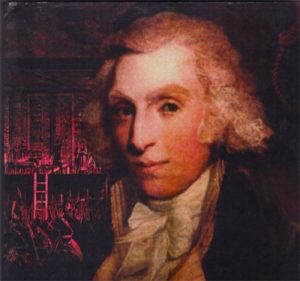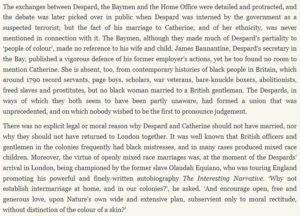My ongoing research into free blacks in Georgian London has netted me two more books. I’m going to talk about the first today: Colonel Despard: The Life and Times of an Anglo-Irish Rebel by Clifford D. Conner. All I knew going in was that Despard had a black wife. I was hoping to find out about how their relationship was viewed and how it affected his career as an officer, but the book focuses vary narrowly on his military career and his trial for rebellion.
There were tiny bits about his personal life that could be gleaned though. His wife, Catharine, was the daughter of an English curate in Jamaica (no information is provided as to whether her parents were married). She was clearly well-educated, and obviously moved in the same circles as the English officers and their wives. Despard married her in the middle of his career (probably in 1785), and promotions continued to follow, so the powers that be in the army didn’t seem to care. Neither did Nelson, who was a friend and testified in Despard’s defense. Catharine traveled with him to his various postings, and appears to have acted as his hostess when he was governing various territories in the West Indies.
Despard’s family on the other hand clearly never accepted the marriage. They referred to Catharine as Despard’s “black housekeeper” and after Despard’s death they offered no assistance to her or to their son (his uncle, General Despard, said that James had “not even an illegitimate claim upon him.”) What we do know is that Despard’s friends took care of them after Despard was executed (they were reportedly given a pension by Sir Francis Burdett and Lord Cloncurry’s memoirs state that they lived with his family in Lyon for some years).
Their son, James Despard, went on to join the military (as an officer, which I think is worth noting). There are various reports of him (usually referred to as a “creole”) that scatter across the first decades of the nineteenth century. He was appointed a captain the London Milita in 1814 after serving in France and supposedly refusing an offer of a high position from Bonaparte (this I find doubtful given Bonaparte’s treatment of the Chevalier Saint-Georges). There are further anecdotes from his spiteful Aunt Jane suggesting that he ran away with an heiress.
So all in all, I read a lot of tedious military history and found the barest scraps of what I was interested in, but I’ll take what I can get when it comes to real life interracial marriages in the period.
It did lead me however to a post by Mike Jay who has also written a book about Despard (The Unfortunate Colonel Despard) that has a more detailed look at the marriage and Catharine. Let me quote it here:
According to Jay, this could well be the first known case of an English gentleman married to a free woman of color, which makes it all the more fascinating.



Fascinating post, Isobel! I always admire people in history who had the courage to fly in the face of unreasonable social norms. There always are some, but evidence is not always available. Congrats on documenting this pair!!
[…] An interracial marriage in Georgian England https://authors.riskyregencies.com/2017/05/19/a-documented-interracial-marraige-in-georgian-england/ […]
Thanks for gleaning those interesting details for us, Isobel. I love learning about the less well known areas of history, especially with relevance to social justice issues which persist today.
I was listening to a podcast about a Jean Grae who discovered that she had white relatives in England because back in the 1800’s there was an interracial marriage. It was really really interesting. Apparently, at some point, the family stopped mentioning that this woman was Black, who by the way sounds absolutely amazing, and it fell away from the family lore. The implication was that at the time, the marriage was viewed differently than it was later, when a generation tried to erase that. The woman Here’s the link: https://gimletmedia.com/episode/5-jean-grae/
It’s fascinating and totally worth listening to.